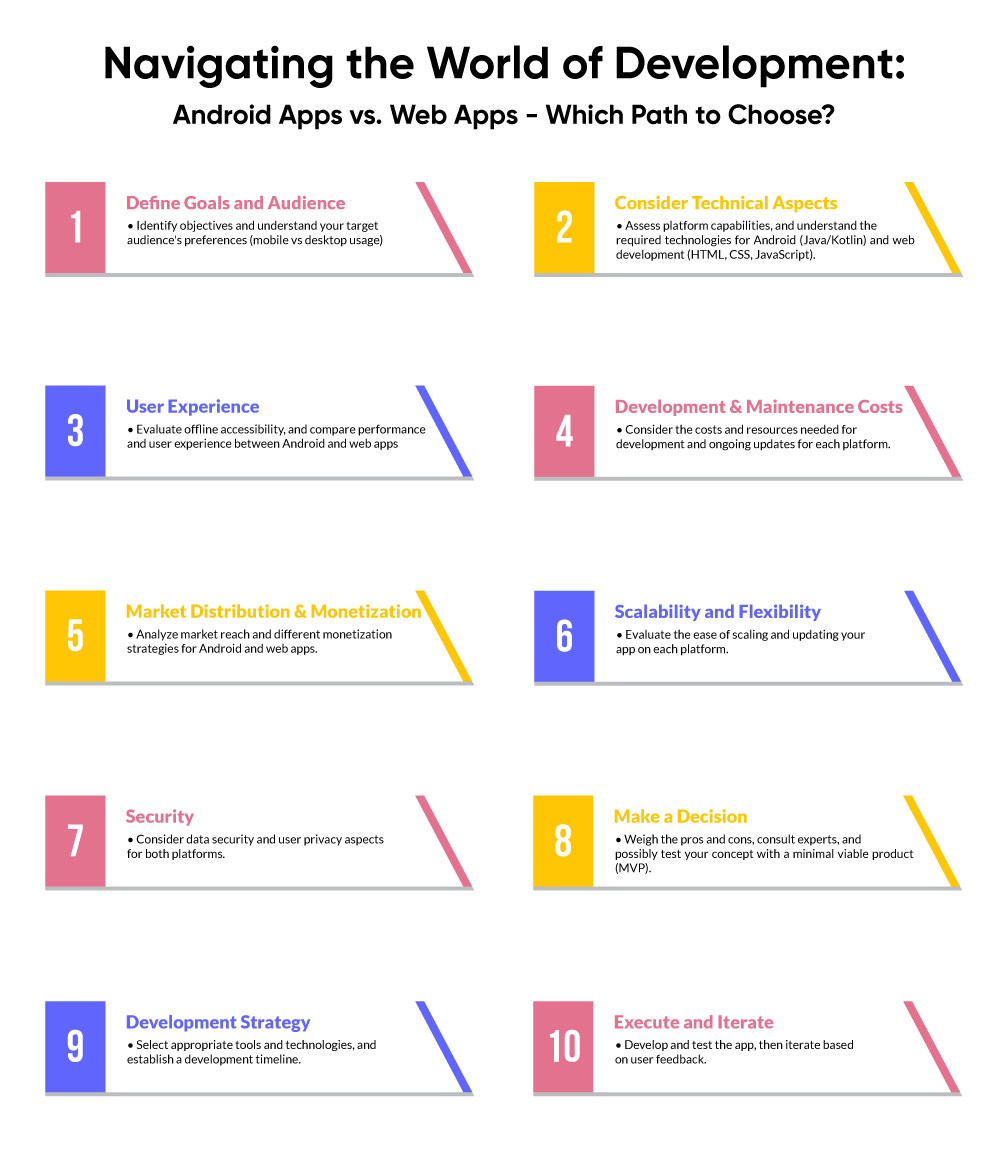Let's Get You Started

Let's Get You Started




Welcome to our in-depth exploration of the tech world’s hottest debate: Android App Development vs Web Development. Whether you’re a budding developer, a business owner deciding on your next digital move, or simply a tech enthusiast, this post is your one-stop resource for understanding the intricacies of these two development realms.
Before diving into the complex waters of Android App Development and Web Development, let’s establish a fundamental understanding of what each entails.
The trend between these two varies across regions, including the US. As per recent studies:
Let’s break down the key differences:
Talking about costs, there are significant differences:
User experience (UX) stands as a pivotal element, irrespective of whether we delve into Android App Development or Web Development. This section aims to dissect the UX considerations unique to each platform, offering insights into how they shape the development process and the end-user interaction.
UX in development is not just about aesthetics; it’s about creating a journey that is intuitive, engaging, and satisfying for the user. It’s the art of making your digital product not just usable but delightful to interact with. In both Android app and web development, the UX is a critical determinant of success. Poor UX can lead to user frustration, drop-offs, and ultimately, a decline in app or website popularity.
Android developers face the challenge of a fragmented market with a myriad of devices, each with different screen sizes and resolutions. Creating a UX that is flexible and adaptive to various screen sizes is paramount.
Mobile users are accustomed to gestures like swiping, tapping, and pinching. Android apps must integrate these gestures seamlessly into their UX design, making navigation natural and intuitive.
Android apps must be optimized for performance, ensuring quick load times and smooth transitions. Users expect a seamless experience without any lag.
Android apps often need to incorporate features like GPS, push notifications, and camera integration, which requires a UX design that’s contextually aware and reactive.
Web developers must ensure that websites offer a consistent UX across different browsers and devices, including desktops, tablets, and smartphones.
Responsive Design:
This is non-negotiable in web development. Websites must automatically adjust their layout and content to fit the screen size they are viewed on.
Load Times and Performance:
Users expect websites to load quickly. Optimizing images, caching, and minimizing HTTP requests are crucial for a smooth UX.
Navigation Structure:
A well-structured, easy-to-navigate website is key. Users should find what they’re looking for in the fewest clicks possible.
Despite their differences, several core principles bridge the gap in UX design across Android and web development:
Both platforms must prioritize the needs and behaviors of users, tailoring the experience to fit their expectations and ease of use.
Visual and functional consistency is crucial in both environments. Users should feel a sense of familiarity every time they interact with the app or website.
User interactions, whether it’s clicking a button or swiping through images, should provide immediate and intuitive feedback.
Ensuring that your app or website is accessible to all users, including those with disabilities, is not just a legal imperative but also a moral one.

| Aspect | Android App Development | Web Development |
| Reach | Limited to Android Users | Universal Access |
| Cost | Generally Higher | Lower Initial Cost |
| Maintenance | Frequent Updates | Less Frequent Updates |
| Development Time | Longer | Shorter |
| Skill Set | Java/Kotlin | HTML/CSS/JavaScript |
It depends on your background. If you’re familiar with Java or Kotlin, Android might be easier. For those versed in HTML/CSS, web development could be more straightforward.
Absolutely! Many web developers learn Java or Kotlin to transition into Android development.
This varies by region and industry. However, both fields have robust demand.
Generally, web development is more cost-effective for startups due to lower initial costs and wider reach.
Consider your target audience, budget, and the kind of service or product you offer. For mobile-centric users, Android apps are preferable, while web development suits a broader audience.
In conclusion, whether you lean towards Android App Development vs Web Development, both fields offer exciting opportunities and challenges. Your choice should align with your career goals, business needs, and the specific preferences of your target audience. Embrace the journey, and happy coding!

Welcome to Appxide, where innovation meets utility in the world of app development. Our mission is to craft cutting-edge digital solutions that simplify lives and spark connections. With a diverse portfolio that traverses multiple sectors, we are committed to excellence and user-centric design. Stay tuned to our blog for the latest in tech, insights, and the stories behind our projects. Dive into the future with us – where every app we create is a step towards the extraordinary.